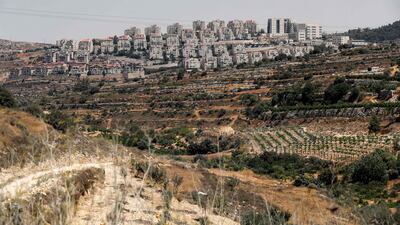Israel on Sunday announced plans to build more homes for Jewish settlers in the occupied West Bank, drawing immediate condemnation from Palestinians, peace activists and neighbouring Jordan.
The Housing and Construction Ministry in right-wing Prime Minister Naftali Bennett's government said tenders had been published for 1,355 homes in the West Bank, which has been occupied by Israel since the 1967 Arab-Israeli War.
Those homes add to the more than 2,000 that defence sources said in August would be authorised for West Bank settlers.
Housing Minister Zeev Elkin, a member of the right-wing New Hope party, said that "strengthening Jewish presence [in the West Bank] was essential to the Zionist vision".
Palestinian Prime Minister Mohammed Shtayyeh, at a weekly Cabinet meeting, called on world nations, especially the US, to "confront" Israel over the "aggression" of settlement building.
The Palestinian Authority will be keenly awaiting a response from US President Joe Biden's administration, which has said it opposes unilateral Israeli settlement building as an obstacle to a two-state solution to the conflict.
About 475,000 Jews live in settlements in the West Bank, which are considered illegal under international law, on land Palestinians claim as part of their future state.
Jordan, an Israeli security partner with whom Mr Bennett has sought to improve ties since taking office in June, condemned the announcement as "a violation of international law".
Jordanian Foreign Ministry spokesman Haitham Abu Al Ful criticised settlement construction and "confiscation" of Palestinian land as "illegitimate."
Anti-occupation group Peace Now said Sunday's announcement proved that Mr Bennett's ideologically diverse coalition, which ousted former prime minister Benjamin Netanyahu's pro-settlement government in June, was not "a government of change".
"This government clearly continues Netanyahu's policy of de facto annexation," Peace Now said.
It urged Mr Bennett's left-wing governing partners, the Labour and Meretz parties, to "wake up and demand the wild building in settlements cease immediately".
Moshe Hellinger, a political scientist at Bar Ilan University, told AFP that the right-wing factions in Mr Bennett's eight-party coalition "need to show their voters that they are defending their interests despite being in a coalition with the left".
Preserving the coalition, which also includes an Islamist party, will require all sides to "swallow snakes", Mr Hellinger said.
Mr Bennett, the former head of a settler lobby group, opposes Palestinian statehood.
He has ruled out formal peace talks with the Palestinian Authority during his tenure, saying he prefers to focus on economic improvements.
Shortly after the announcement, the Defence Ministry said that it was issuing an additional 9,000 permits for West Bank Palestinians to work in the Israeli building industry.
The goal is to add another 6,000 permits "shortly", the ministry said.
About 120,000 Palestinians have permits to work inside Israel or in settlements, generally earning far higher wages than would be paid in the West Bank.
The new homes are to be built in seven settlements, the Housing and Construction Ministry said.
Israeli settlement expansion in the West Bank and annexed East Jerusalem has continued under every Israeli government since 1967.
But construction accelerated in the past few years under Mr Netanyahu, with a significant boom during former president Donald Trump's US administration, which Palestinians accused of egregious pro-Israel bias.


